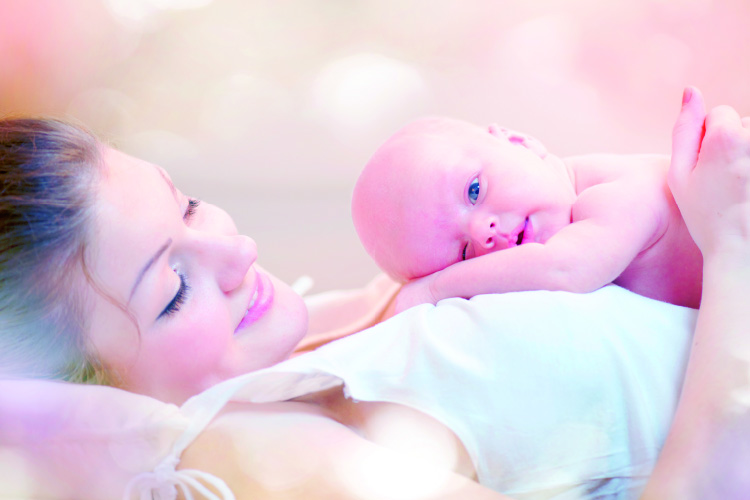Early on, you may already start picking up signs that your newborn is happy or unhappy. Crying, smiling, fussing – these are all the ways your little one communicates with you. But what are the other signs to show that she is doing well and feeling comfortable? These ten tell-tale signs will tell you more.
Right from the start, you would probably learn and know when a toddler is unhappy or in discomfort. But it’s only after the first month that a baby’s first true milestone in happiness emerges and takes the form of a beautiful smile on his perfect little face. Here are many more clues that would signal that your pride and joy is feeling joy.
Table of Contents
1. Peaceful Gaze
When you smile at a baby and all you get is a blank, sleepy stare; it may frustrate you but the actual truth is that it is a good sign after all. A baby seeks comfort and serenity at the sight of his caregiver’s face and the tone of his or her voice. According to Linda Arcredolo, Ph.D., cofounder of Baby Signs. Inc, newborns do not have any other capacity other than by looking peaceful. That is their expression towards positive emotions. There are two ways to look at a baby’s emotion. They either cry or they don’t. A baby looking towards you as he gazes at your face – that is him telling him that all is good in baby-land.
SMART TIP!
Pay attention when your baby is spacing out. It may not be anything to you but spacing out is part of a baby’s progress. Take for example, if your baby is staring blankly at the ceiling fan, he may be paying attention to the fan’s movement and learning about his environment. Movement, colours and patterns capture their attention.
2. Cosy in Your Arms
A good holding pattern and a baby that conforms his body to your arms is a happy baby. If she arches her back, then it is time for you to change the holding pattern. Between the ages of 0 to 3 months, a baby is happy when you respond to his cries, keep him clean, full and lullaby him to sleep. He will show you his signs of approval once he falls asleep, snuggled in your arms.
3. Regular Diaper Duty
Consistent diaper change may seem like a strange sign that a baby is healthy and happy, but it’s actually important to check if his pee and bowel movements are normal. If you are changing somewhere between 8-10 wet diapers a day then your baby is definitely normal and healthy. Generally, your baby may urinate as often as every one to three hours or as infrequently as four to six times a day. Also the frequency of bowel movements varies widely from one baby to another. Many pass a stool soon after each feeding.
4. Sleeping Like a Baby
Your baby needs sleep and he also needs a good place to sleep in. Parents tend to be with their babies when they are tucking them to sleep but research have also shown that about sixty percent of babies who goes to bed, accompanied by their parents wake up more often during the night compared to those who fall asleep alone. This said, it is not cruel to let your baby sleep on his own. A sleeping schedule and consistent bedtime routine will help your baby sleep better. Lay him down when she is drowsy, not when he is completely asleep.
SMART TIP!
While it feels good to rock your baby to sleep, it may not necessarily be good. If he is constantly being tucked to sleep then he probably won’t learn to fall asleep on his own, unless being rocked back to sleep.
5. Me-Time with Your Baby
Spend some “baby and me” time each day, just talking – never mind if your little one doesn’t understand what you are saying. It’s your presence and attention that count the most. “Every child should have quality time each day with Mom or Dad where he or she is doing some vocal play,” says Linda Crowe, Associate Professor of Communication Sciences and Disorders at Kansas State University.
6. Breathing Easy
A healthy child has good respiratory health. This starts from his home environment where clean air is a necessity. So make sure spaces are smoke-free. Problems like asthma, colic and even sudden infant death syndrome (SIDS) has been proven to have derived from second-hand smoking. Not only that, babies exposed to smoke also have impaired cognitive skills; even at low levels, they will have difficulties in reading, mathematics and spatial reasoning. Ensure your home is a non-toxic environment with plenty of fresh air. Invest in an air-purifier if possible, to cleanse the air of allergens that may irritate your baby.
7. Excellent Dental Health
Good teeth and normal teething indicates a healthy baby – never mind if she gets fussy a lot when her first tooth is showing. As soon as your little one hits the age of 1, take him to the dentist. Brush his teeth gently with water. As for pacifier or thumb sucking habit, wean the little one off by the age of 4. This is to avoid teeth defect, shape and how the teeth grow. Consult your paediatrician for flu shots and vaccines. Most paediatricians will recommend flu shots at 6 months old.
8. Laughing Out Loud
Parenting is no laughing matter but babies need to laugh. Quality bonding time with parents gets babies thrilled and happy. Make funny noises and play with them as they graduate from smiles to laughter. Babies aged 6 months onwards love the element of surprise. Tickle them silly. They say laughter is the best medicine, well of course it is.
9. Curious Explorer
A curious baby is a healthy and happy baby as he starts to explore his surroundings and pays attention to all surrounding noises – especially music. Be it a toy or from your music player, age appropriate toys with musical themes are often a favourite with both parents and babies as they help them develop a keen sense of hearing and mental skills.
10. Happy Parents
Healthy parents make happy babies. It can be very easy to go down the path of parental guilt, especially for working parents. Learn and know that your baby does not need you to pamper him 24/7 and some time away can actually do you both some good. More often than not, it is not about the number of hours spent between parents and baby but rather, how often parents engage their baby in play or talks. Remember parents, quality over quantity. So take good care of yourself, ensure you have all you need to be a happy and healthy parent – only then your baby can thrive on in happiness and health.
















